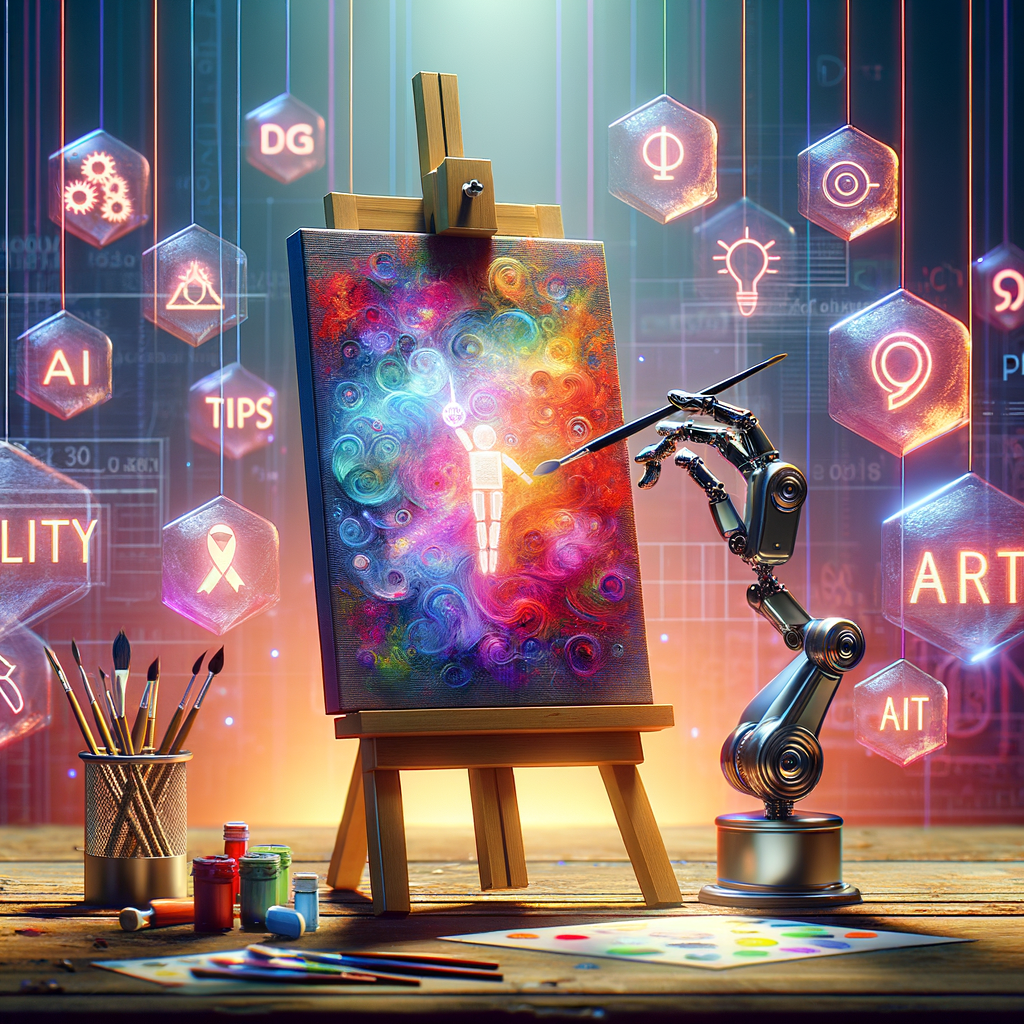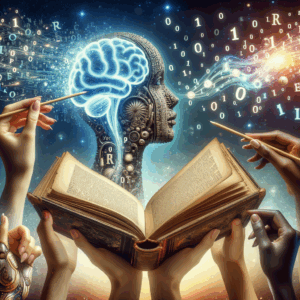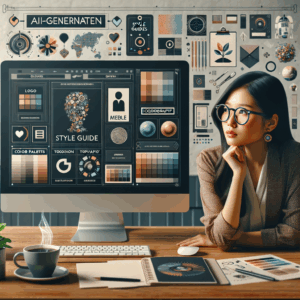
AI Art: Stunning Tips For Effortless Professional Quality
- Understanding AI Art: The New Wave of Creativity
- Choosing the Right AI Art Tool
- Popular AI Art Tools
- User-Friendly Features
- Mastering the Basics of AI Art
- Style Transfer
- Generative Art
- Image Synthesis
- Setting Up Your Creative Workspace
- Lighting and Atmosphere
- Tech Essentials
- Getting Inspired
- Leveraging AI Capabilities for Maximum Impact
- Customization Options
- Utilizing Filters and Effects
- Engaging with AI Prompts
- Incorporating Personal Style
- Experimentation is Key
- Consistency Matters
- Seeking Feedback
- Making the Most of Your AI Art Creations
- Showcasing Your Work
- Social Media and Online Platforms
- Selling Your Work
- Future Trends in AI Art
- Rising Accessibility
- Integration with Other Technologies
- Collaboration with Humans
- Tips for Ongoing Improvement
- Stay Curious
- Join Online Communities
- Seek Inspiration in Different Mediums
- FAQs About AI Art
- 1. What is AI art?
- 2. Do I need experience to create AI art?
- 3. What tools are recommended for beginners?
- 4. Can I sell AI-generated art?
- 5. How can I improve my AI art skills?
- 6. Is AI art considered original?
- 7. Can I combine AI art with traditional art techniques?
- 8. How does AI understand artistic styles?
- 9. What are common mistakes to avoid in AI art?
- 10. How will AI influence the art world in the future?
- Conclusion
- References
Understanding AI Art: The New Wave of Creativity
AI art has revolutionized the creative landscape. Artists and non-artists alike now have the chance to create stunning visuals without traditional training. By leveraging algorithms and machine learning, anyone can turn their ideas into beautiful artwork. This accessibility is one of the main reasons AI art has gained traction.
The integration of technology into art presents exciting opportunities. Most importantly, it allows for an exploration of new artistic styles and genres. Plus, AI tools can help you refine your work and enhance your creativity. In a world where creativity is vital, AI art serves as a powerful ally.
This post will guide you through effective tips for creating professional-quality AI art effortlessly. You’ll discover not just how to get started but also how to elevate your creations. Let’s explore the magic of AI art together!
Choosing the Right AI Art Tool
Selecting the right AI art tool matters a lot. The range of software available can be overwhelming. However, each tool has unique features to suit various needs and preferences.
Popular AI Art Tools
Here are a few popular choices that can help you create art easily:
1. DALL-E: Creates images from textual descriptions.
2. DeepArt: Uses neural networks to turn photos into artwork.
3. Runway ML: Provides a suite of creative tools for artists.
4. Artbreeder: Combines different images to produce novel results.
When choosing a tool, think about what you want to achieve. Do you prefer to start from scratch or modify existing images? Some tools focus on specific styles, while others offer wide-ranging customization options.
User-Friendly Features
Look for features that enhance usability. For instance, drag-and-drop functions, preset templates, and tutorials are invaluable for beginners. These features can simplify your workflow and make the creative process enjoyable.
Also, consider the community surrounding each tool. User forums and social channels can provide inspiration and support as you navigate your artistic journey.
Mastering the Basics of AI Art
Understanding the fundamentals will enhance your AI art experience. Familiarize yourself with core concepts like style transfer, generative art, and image synthesis.
Style Transfer
Style transfer allows you to apply the visual style of one image to another. For example, you can turn a photograph into a painting that resembles Van Gogh’s work. This technique is widely used and incredibly powerful for those wanting to add flair to their images.
Generative Art
Generative art involves algorithms that create artwork autonomously. The artist sets parameters, and the AI fills in the blanks based on those guidelines. You can explore variations of your original idea without putting in as much effort.
Image Synthesis
Image synthesis combines elements from different pictures to create something new. Using this technique, you can mix various artistic styles into a single piece.
Understanding these basics will reshape your approach to art. You’ll be better equipped to utilize these techniques and develop your unique style.
Setting Up Your Creative Workspace
A well-organized workspace boosts productivity. Make sure you have a comfortable environment that stimulates creativity. This involves adjusting lighting, decluttering, and ensuring your tech runs smoothly.
Lighting and Atmosphere
Natural light can enhance your mood and boost creativity. If possible, place your workspace near a window. When natural light isn’t an option, invest in good-quality lamps that simulate daylight.
Tech Essentials
Ensure your computer and software run efficiently. Regular updates can prevent potential issues and keep you ready to work at any moment. A good-quality graphics tablet can also make your workflow smoother and allow for more precise artwork.
Getting Inspired
Create a vision board of artworks you admire. Pin relatable articles, images, and quotes that inspire you. Regularly revisiting your board can invigorate your creative flow.
Leveraging AI Capabilities for Maximum Impact
Understanding how to leverage AI features is crucial. Each tool offers its own capabilities that can significantly enhance the quality of your artwork.
Customization Options
Spend time exploring the customization options available in your selected software. Adjusting color palettes, brush sizes, and textures can yield striking results. Experimentation is key; don’t hesitate to try different combinations to see what works for you.
Utilizing Filters and Effects
Filters and effects can dramatically transform your artwork. Subtle adjustments can elevate a piece from ordinary to extraordinary. You might choose to add textures, play with contrast, or apply color gradients to achieve the desired look.
Engaging with AI Prompts
Some tools offer prompts that can guide your artistic journey. These prompts often spark new ideas or directions for your work. Engaging with these suggestions encourages exploration and can lead to unexpected breakthroughs.
Incorporating Personal Style
AI art opens doors, but it’s essential to make your artwork your own. Finding a personal style sets you apart from others using similar tools. Here’s how to achieve that.
Experimentation is Key
Don’t be afraid to play around with styles and techniques. You might start with a specific art style and gradually integrate elements from others. This fusion can help you discover a credible personal touch.
Consistency Matters
While experimentation is important, consistency in your work can help build your brand. Choose certain colors, themes, or styles that resonate with you. Consistent elements can create a signature look across your portfolio.
Seeking Feedback
Feedback is invaluable for growth. Share your work with friends, family, or online communities. Constructive criticism can help you identify your strengths and areas for improvement.
Making the Most of Your AI Art Creations
Now that you have a grasp of creating AI art, it’s time to consider how you wish to use your creations.
Showcasing Your Work
Creating a portfolio is a great way to show off your art. Make sure to select your best pieces that reflect your unique style. A well-presented portfolio attracts more attention, whether it’s for personal or commercial use.
Social Media and Online Platforms
Utilize social media to share your art. Platforms like Instagram, Pinterest, and TikTok provide excellent venues for visibility. Use relevant hashtags to reach a broader audience, and engage with other artists to build a supportive community.
Selling Your Work
If you’re interested in monetizing your art, consider online marketplaces like Etsy, Redbubble, or Society6. Selling prints, merchandise, or digital downloads can generate income while allowing you to share your art with the world.
Future Trends in AI Art
The landscape of AI art is evolving rapidly. It’s essential to keep an eye on upcoming trends to stay ahead.
Rising Accessibility
As technology advances, AI tools will continue to become more accessible. Expect even more user-friendly applications with intuitive interfaces and advanced features. This shift will empower more creators to jump into the world of art.
Integration with Other Technologies
The integration of AI art tools with other technologies like virtual reality (VR) and augmented reality (AR) will redefine how art is experienced. Imagine walking through an AR gallery featuring your AI-generated artwork!
Collaboration with Humans
AI art will increasingly focus on collaboration rather than replacement. Artists and AI will work together, pushing each other’s boundaries and exploring new possibilities. This union can lead to an unprecedented level of creativity.
Tips for Ongoing Improvement
Continuous improvement is essential for any artist. Here are a few tips to keep in mind.
Stay Curious
Always open yourself to learning. Attend courses, webinars, or workshops to expand your skill set. The art world is vast, and new techniques emerge constantly.
Join Online Communities
Connecting with fellow artists can offer support and inspiration. Join forums, Facebook groups, or Discord servers related to AI art. Sharing experiences and resources enriches your artistic journey.
Seek Inspiration in Different Mediums
Engage with various art forms outside of AI. Visit galleries, read art history books, or watch documentaries. Each new influence can bring fresh ideas to your approach.
FAQs About AI Art
1. What is AI art?
AI art involves using artificial intelligence tools to create artwork. These tools can generate images based on user input or artistic styles.
2. Do I need experience to create AI art?
No! AI art platforms are designed for all skill levels. You can start creating even with limited artistic experience.
3. What tools are recommended for beginners?
Popular beginner-friendly tools include DALL-E, Artbreeder, and DeepArt. These programs offer user-friendly interfaces and tutorials.
4. Can I sell AI-generated art?
Yes, you can sell AI-generated art on platforms like Etsy or Redbubble. Just ensure you follow the platform’s guidelines.
5. How can I improve my AI art skills?
Continue to learn through tutorials, workshops, and feedback from other artists. Experimentation will help you develop your unique style.
6. Is AI art considered original?
AI art sparks a debate about originality. While the AI generates images, your input significantly defines the outcome, making it a collaborative effort.
7. Can I combine AI art with traditional art techniques?
Absolutely! Many artists blend AI art techniques with traditional methods, like painting or drawing, to create unique pieces.
8. How does AI understand artistic styles?
AI uses algorithms and datasets of existing artwork to learn about different styles. This data informs its ability to generate new images based on user inputs.
9. What are common mistakes to avoid in AI art?
Avoid relying solely on AI suggestions. Engage actively with the creative process and personalize your work. Over-editing can also detract from artistic expression.
10. How will AI influence the art world in the future?
AI is set to revolutionize art by enhancing collaboration between technology and artists. Emerging trends will create new forms and genres, making art even more diverse.
Conclusion
AI art represents an exciting frontier in creativity. With the right tools and techniques, anyone can create professional-quality artwork effortlessly. By understanding the basics, refining your skills, and leveraging AI capabilities, you can embark on an inspiring artistic journey.
Always remember, the most important part of creating art is enjoying the process. As you explore AI art, let your creativity flow and experiment with different approaches. Who knows what stunning creations you can bring to life?
References
– What is AI Art?
– The Future of AI in Art
– How to Create Generative Art

